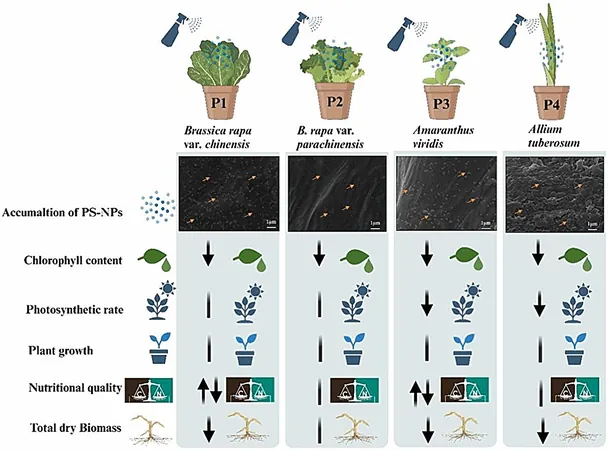
Shocking Link Between Air Pollution and Eczema Revealed by Groundbreaking Study!
2024-11-20
Author: Charlotte
If you thought air pollution only affected your lungs, think again! New and alarming research indicates that your skin might also be paying a hefty price for living in a polluted environment. A recent study involving over 280,000 individuals across the United States has uncovered a startling correlation between elevated levels of fine particulate matter (PM2.5) and the prevalence of eczema—an agonizing skin condition characterized by itching, redness, and discomfort.
Eczema Rates Skyrocket in Polluted Areas
The research highlights that individuals exposed to heightened concentrations of PM2.5 are more than twice as likely to develop eczema when compared to those living in cleaner regions. This sends a clear message that the deteriorating air quality in cities and near busy roadways is not just a respiratory hazard but a skin menace as well.
The study showcases how environmental factors can impact skin health, raising urgent concerns about protective measures as pollution levels continue to surge.
What is PM2.5 and Why is it Dangerous?
PM2.5 refers to particulate matter measuring less than 2.5 micrometers in diameter, so minuscule that it's nearly invisible to the naked eye. These tiny particles, emitted from vehicles, industrial sites, and even wildfires, contain hazardous chemicals—including polycyclic aromatic hydrocarbons (PAHs)—that pose significant health risks. Previous studies have already linked PM2.5 exposure to respiratory and cardiovascular issues, but its effect on skin health has been largely under-researched—until now.
Air Pollution's Insidious Role in Skin Health
This groundbreaking research marks a key step in uncovering the connections between pollution and skin conditions. Participants suffering from eczema displayed exposure to PM2.5 levels that were consistently above average compared to their eczema-free counterparts. Remarkably, this relationship persisted even after factoring in other variables that could influence eczema risk, leading researchers to suggest a robust link between air quality and skin health.
While this study alone cannot definitively prove that air pollution causes eczema, it aligns with a growing body of literature illustrating how pollution can impact our skin. PM2.5's diminutive size allows it to breach the skin barrier—the body's first line of defense—penetrating deeper layers and causing serious cellular damage. This intrusion leads to heightened inflammation and sensitivity, exacerbating symptoms for those already battling eczema.
The Immune Response Connection
So, how does PM2.5 worsen eczema? It appears that these particles can interfere with our skin’s immune responses. When PM2.5 comes into contact with the skin, it binds to a receptor known as the aryl hydrocarbon receptor (AhR), which plays a crucial role in mediating how cells respond to environmental toxins. This interaction can trigger inflammatory responses in the skin, leading to the very symptoms that characterize eczema: itching, swelling, and redness.
Moreover, findings suggest that individuals already prone to eczema have compromised skin barriers, making them especially vulnerable to external irritants like PM2.5. As such, these pollutants may amplify the skin's susceptibility to inflammation and other negative reactions.
A Growing Global Crisis
These revelations emerge at a critical juncture, as global air pollution levels continue to climb. According to the World Health Organization, about 90% of the world’s population breathes polluted air that poses health risks. Vulnerable groups, including children, the elderly, and those with existing skin conditions, are particularly at risk for developing debilitating eczema.
The implications of this research extend beyond respiratory issues; it shows that our skin—our body’s largest organ—is just as imperiled by pollution. Recognizing these connections could pave the way for policies aimed at enforcing tougher air quality standards, thus safeguarding both the air we inhale and the skin we depend on.
Protecting Your Skin in a Polluted World
On an individual level, mitigating exposure to polluted air may help those susceptible to eczema. Experts recommend staying indoors during high pollution events, utilizing air purifiers, and covering exposed skin to shield it from harmful particles.
Exciting developments in treatment options are also on the horizon. Research targeting the AhR pathway indicates promising potential for treatments designed to activate "protective" pathways in the skin, which could alleviate eczema symptoms associated with elevated PM2.5 exposure. A new cream, Tapinarof, is currently undergoing trials and may provide a glimmer of hope for eczema sufferers inundated by pollution and its damaging effects.
Stay informed and protect your skin—because what you breathe in could have a profound impact on how your body feels!









 Brasil (PT)
Brasil (PT)
 Canada (EN)
Canada (EN)
 Chile (ES)
Chile (ES)
 España (ES)
España (ES)
 France (FR)
France (FR)
 Hong Kong (EN)
Hong Kong (EN)
 Italia (IT)
Italia (IT)
 日本 (JA)
日本 (JA)
 Magyarország (HU)
Magyarország (HU)
 Norge (NO)
Norge (NO)
 Polska (PL)
Polska (PL)
 Schweiz (DE)
Schweiz (DE)
 Singapore (EN)
Singapore (EN)
 Sverige (SV)
Sverige (SV)
 Suomi (FI)
Suomi (FI)
 Türkiye (TR)
Türkiye (TR)